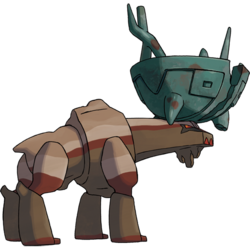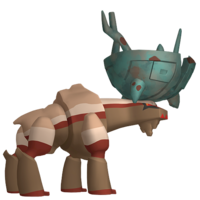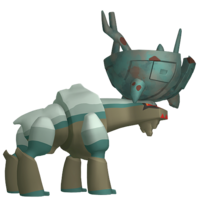From Bulbapedia, the community-driven Pokémon encyclopedia.
|
|
| Line 227: |
Line 227: |
| The vessel on Ting-Lu's head is based on a 鼎 ''{{wp|Ding (vessel)|dǐng}}'', an ancient Chinese cauldron that served as a symbol of imperial authority. The deer and ''dǐng'' elements together may be chosen in reference to the pair of phrases: 問鼎 / 问鼎 ''wèndǐng'' (lit. "to inquire about the cauldron") and 逐鹿 ''zhúlù'' (lit. "to hunt for deer"), both of which connotes the vying for supremacy and aspirations for the throne. | | The vessel on Ting-Lu's head is based on a 鼎 ''{{wp|Ding (vessel)|dǐng}}'', an ancient Chinese cauldron that served as a symbol of imperial authority. The deer and ''dǐng'' elements together may be chosen in reference to the pair of phrases: 問鼎 / 问鼎 ''wèndǐng'' (lit. "to inquire about the cauldron") and 逐鹿 ''zhúlù'' (lit. "to hunt for deer"), both of which connotes the vying for supremacy and aspirations for the throne. |
|
| |
|
| It along with the other Treasures of Ruin may be based on the {{wp|Four Perils}} of Chinese mythology, specifically {{wp|Taotie}}, a gluttonous beast that is a common artistic motif in ancient bronze vessels, as well as ''Qiongqi'', which is sometimes depicted as a man-eating deer. | | It along with the other Treasures of Ruin may be based on the {{wp|Four Perils}} of Chinese mythology, specifically {{wp|Taotie}}, a gluttonous beast that is conventionally used by 11th century Chinese antiquarians to name the common beast face motif in ancient bronze vessels, as well as ''Qiongqi'', which is sometimes depicted as a man-eating deer or bovine. Given that the [[Paldea]], the region where it became a Ruinous Pokémon is based on the {{wp|Iberian peninsula}}, the body shape of Ting-Lu may also take inspiration from zoomorphic {{wp|Iberian sculpture}}s, such as the {{wp|Bicha of Balazote}} or the {{wp|verraco}} granite sculptures. Specifically, verraco sculptures are commonly found in Northwestern Iberia, which corresponds to the in-game location of Ting-Lu and the [[Groundblight Shrine]]. |
|
| |
|
| ====Name origin==== | | ====Name origin==== |
Revision as of 11:37, 14 August 2023
Ting-Lu (Japanese: ディンルー Dinlu) is a dual-type Dark/Ground Legendary Pokémon introduced in Generation IX.
It is not known to evolve into or from any other Pokémon.
Along with Wo-Chien, Chien-Pao, and Chi-Yu, Ting-Lu is a member of the Treasures of Ruin.
Biology
Ting-Lu is a large Pokémon resembling a cloven-hoofed mammal such as a deer or a moose. Its body is composed of layered rock, ranging in color from dark brown to a light tan. Its head has several red markings, as well as small red eyes and what appears to be a dewlap on its chin. Upon its head is a large ritual vessel cracked down the middle, with an ornate rectangular pattern resembling eyes at the front, and several antler-like spikes jutting out from the rim.
Like the other Treasures of Ruin, Ting-Lu's true form is that of the ritual vessel on its head, having been given life by the fear of humans from ancient times — while its body is a form it has constructed using its control over the earth. Ting-Lu is described as being able to create fissures over 160 feet (50 meters) deep just by slowly putting down its head on the ground. It is known as the Vessel of Ruin.
Ting-Lu and the other Treasures of Ruin are the only known Pokémon capable of learning the move Ruination. Ting-Lu is also the only known Pokémon that can have Vessel of Ruin as an Ability.
In the anime
Major appearances
Minor appearances
In the manga
In the TCG
- Main article: Ting-Lu (TCG)
Game data
Pokédex entries
| This Pokémon was unavailable prior to Generation IX.
|
| Generation IX
|
|
|
Paldea
#395
|
| Scarlet
|
The fear poured into an ancient ritual vessel has clad itself in rocks and dirt to become a Pokémon.
|
| Violet
|
It slowly brings its exceedingly heavy head down upon the ground, splitting the earth open with huge fissures that run over 160 feet deep.
|
|
|
Game locations
| This Pokémon was unavailable prior to Generation IX.
|
|
|
In side games
Held items
Stats
Base stats
Version 1.0.0
| Stat
|
Range
|
| At Lv. 50
|
At Lv. 100
|
165
|
|
225 - 272
|
440 - 534
|
110
|
|
103 - 178
|
202 - 350
|
130
|
|
121 - 200
|
238 - 394
|
50
|
|
49 - 112
|
94 - 218
|
80
|
|
76 - 145
|
148 - 284
|
45
|
|
45 - 106
|
85 - 207
|
Total: 580
|
|
- Minimum stats are calculated with 0 EVs, IVs of 0, and (if applicable) a hindering nature.
- Maximum stats are calculated with 252 EVs, IVs of 31, and (if applicable) a helpful nature.
|
Version 1.0.1+
| Stat
|
Range
|
| At Lv. 50
|
At Lv. 100
|
155
|
|
215 - 262
|
420 - 514
|
110
|
|
103 - 178
|
202 - 350
|
125
|
|
117 - 194
|
229 - 383
|
55
|
|
54 - 117
|
103 - 229
|
80
|
|
76 - 145
|
148 - 284
|
45
|
|
45 - 106
|
85 - 207
|
Total: 570
|
Other Pokémon with this total
|
- Minimum stats are calculated with 0 EVs, IVs of 0, and (if applicable) a hindering nature.
- Maximum stats are calculated with 252 EVs, IVs of 31, and (if applicable) a helpful nature.
|
Type effectiveness
| Under normal battle conditions in Generation IX, this Pokémon is:
|
|
|
|
|
|
|
|
|
|
|
|
|
Learnset
|
|
|
|
- Bold indicates a move that gets STAB when used by Ting-Lu
- Italic indicates a move that gets STAB only when used by an Evolution of Ting-Lu
|
|
|
|
|
- Bold indicates a move that gets STAB when used by Ting-Lu
- Italic indicates a move that gets STAB only when used by an Evolution or an alternate form of Ting-Lu
|
|
|
|
|
- Moves marked with an asterisk (*) must be chain bred onto Ting-Lu
- Bold indicates a move that gets STAB when used by Ting-Lu
- Italic indicates a move that gets STAB only when used by an Evolution of Ting-Lu
|
Side game data
Pokémon GO
| File:GO1003.png
|
Base HP: 321
|
Base Attack: 194
|
Base Defense: 203
|
| Egg Distance: N/A
|
Buddy Distance: ? km
|
Evolution Requirement: N/A
|
| Fast Attacks:
|
| Charged Attacks:
|
|
|
Evolution data
Sprites
| This Pokémon was unavailable prior to Generation IX.
|
|
|
|
|
Trivia
- Ting-Lu and the other Treasures of Ruin are the first Pokémon whose base stats were adjusted via a patch to the game.
- Out of the Treasures of Ruin, Ting-Lu was the only one to have a Stat increased during the Pokémon Scarlet and Violet 1.01 version patch. However, Ting-Lu still suffered an overall base stat decrease by 10 points like the rest of the Treasures of Ruin.
Origin
Ting-Lu seems to be based on various species of the deer family, such as the moose, the elk, and the Père David's deer, the latter of which is native to China. In particular, the cracked vessel on its head appears to be based on the broad, palmate antler of the Eurasian elk. Given the Pokedex's reference to its remarkably heavy head, it may also be based on the Irish elk, an extinct cervid known to have carried the largest antlers of any known deer. The overall design of Ting-Lu may also refer to Chinese stone sculptures along sacred ways to tombs and mausolea, as well as deer stones in the Eurasian Steppe. The horizontal stripes along its body resembles the layering of sediments in rock formations.
The vessel on Ting-Lu's head is based on a 鼎 dǐng, an ancient Chinese cauldron that served as a symbol of imperial authority. The deer and dǐng elements together may be chosen in reference to the pair of phrases: 問鼎 / 问鼎 wèndǐng (lit. "to inquire about the cauldron") and 逐鹿 zhúlù (lit. "to hunt for deer"), both of which connotes the vying for supremacy and aspirations for the throne.
It along with the other Treasures of Ruin may be based on the Four Perils of Chinese mythology, specifically Taotie, a gluttonous beast that is conventionally used by 11th century Chinese antiquarians to name the common beast face motif in ancient bronze vessels, as well as Qiongqi, which is sometimes depicted as a man-eating deer or bovine. Given that the Paldea, the region where it became a Ruinous Pokémon is based on the Iberian peninsula, the body shape of Ting-Lu may also take inspiration from zoomorphic Iberian sculptures, such as the Bicha of Balazote or the verraco granite sculptures. Specifically, verraco sculptures are commonly found in Northwestern Iberia, which corresponds to the in-game location of Ting-Lu and the Groundblight Shrine.
Name origin
Ting-Lu and Dinlu may be a combination of 鼎 dǐng (ancient Chinese cauldron) and 鹿 lù (Chinese for deer). The English name is formatted in Wade–Giles, a romanization system used in the Anglosphere for most of the 20th century.
In other languages
| Language
|
Title
|
Meaning
|
 Japanese Japanese
|
ディンルー Dinlu
|
From 鼎 dǐng and 鹿 lù
|
 French French
|
Dinglu
|
Transcription of Japanese name
|
 Spanish Spanish
|
Ting-Lu
|
Same as English name
|
 German German
|
Dinglu
|
Transcription of Japanese name
|
 Italian Italian
|
Ting-Lu
|
Same as English name
|
 Korean Korean
|
딩루 Dinglu
|
Transcription of Japanese name
|
 Mandarin Chinese Mandarin Chinese
|
古鼎鹿 Gǔdǐnglù
|
From 古 gǔ, 鼎 dǐng, and 鹿 lù
|
 Cantonese Chinese Cantonese Chinese
|
古鼎鹿 Gúdínglúk
|
From 古 gú, 鼎 díng, and 鹿 lúk
|
|
|
|
| More languages
|
 Thai Thai
|
ติ่งลู่ Tinglu
|
Transcription of Japanese name
|
|
|
|
Related articles
External links

|
This Pokémon article is part of Project Pokédex, a Bulbapedia project that aims to write comprehensive articles on each Pokémon species, as well as Pokémon groups and forms.
|
 For other sprites and images, please see Ting-Lu images on the Bulbagarden Archives.
For other sprites and images, please see Ting-Lu images on the Bulbagarden Archives.



